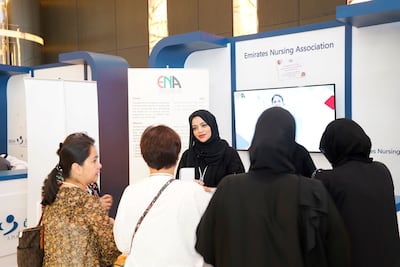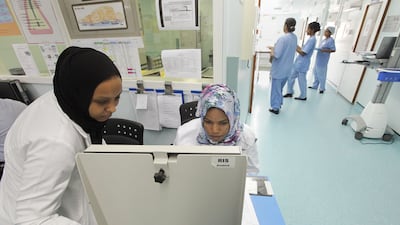The UAE's leading healthcare operator has embarked on a major Emirati nursing recruitment drive as it seeks to bolster the number of citizens employed in the sector.
Abu Dhabi Health Services Company, better known as Seha, hired 150 Emirati graduates from Fatima College of Health Sciences towards the end of last year.
The move was in support of Seha's wider goal to employ more Arabic speakers — from within the UAE and the wider region — in its network of hospitals, clinics and health centres.
"We have an intention to bring more Emirati nursing graduates from Fatima College," said Muayyad Hussein, corporate director of nursing for Seha, on the sidelines of the healthcare provider's ninth annual International Nursing and Midwifery Conference in Abu Dhabi.
Seha employs about 4,700 nurses — 200 of them Emiratis — and aims to increase this number to 5,200.
As well as increasing its Emirati workforce, the operator has focused recruitment efforts on Jordan and the Philippines to help it reach its nursing staff target.
Seha's nurses are predominantly drawn from India and the Philippines, the health group said.

Closing gender gap
Bridging a gender gap in the nursing profession — which is mirrored around the world — would provide further opportunities to increase employment numbers.
Statistics provided by Seha show that less than 1 per cent of Emirati nurses are male.
Shaikha Al Shamsi, director of nursing at Al Ain Hospital, said while progress has been made, nursing remains a profession largely associated with women.
The UAE has sought to increase Emirati and male representation in the nursing profession for many years.
Figures released in 2019 revealed only 8 per cent of nursing staff at public hospitals in the country were from the UAE.
Dr Sumaya Al Bloushi, director of the Ministry of Health’s nursing department, said at the time that addressing the issue was a tough challenge.
“We need to increase the Emiratisation rate in the nursing profession,” she told a health conference in Dubai.
“A particular challenge is to motivate male Emiratis to become nurses, as only six male students are studying nursing at the moment.”
Another challenge for Seha is finding specialised nurses for key departments such as paediatrics, oncology, critical care, mental health and midwifery.
"Specialisation for nurses in the UAE is limited," said Nathrat Al Kindi, chief nursing officer at Corniche Hospital.
"However, Ras Al Khaimah University does offer some specialised programmes, such as midwifery and paediatrics."
Ensuring existing talent remains in the Emirates is another priority, said Dr Marie James, director of nursing at Seha Kidney Care.
"The challenge to retaining specialised nurses is immigration to the West and we need to focus on retaining local talent," she said.
Dr James highlighted the success of a training programme aimed at helping experienced nurses become specialists in nephrology, which focuses on kidney care.
Fifteen nurses have been trained under the scheme since its introduction in 2021.
Dr James believes important strides are being made to improve the nursing profession.
"We are seeing more hospitals coming into the system with strong leadership support for nurses," she said.
"I feel this has begun to change how the nursing profession is viewed in the region."

